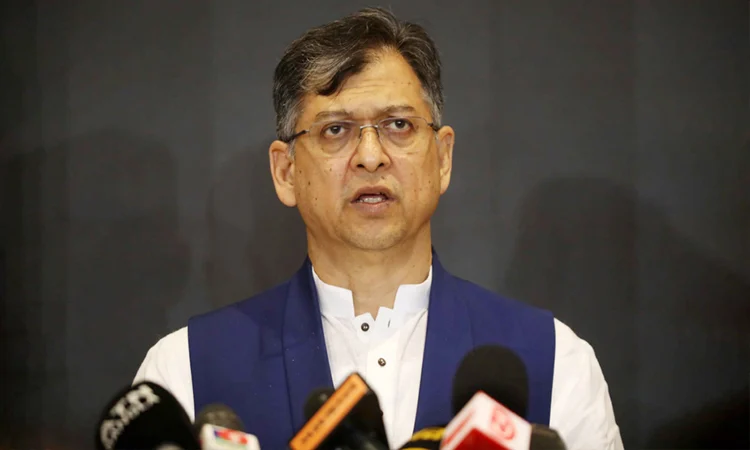News Flash


DHAKA, Nov 17, 2025 (BSS) – BNP Standing Committee Member Salahuddin Ahmed today said that the people of the country are eager for the upcoming national parliamentary election.
He said, “We have welcomed the electoral process. National sovereignty can never be imposed by any order, as the National Parliament embodies the highest sovereignty of the country. People elect their representatives through voting. The people of the country are eagerly waiting to cast their votes, having been deprived of their voting rights for 15–16 years.”
Salahuddin made these remarks as the chief guest at a seminar titled "Transformation of Bangladesh’s Future Education: A Strategic Roadmap," held at the Senate Bhaban (Building) of Dhaka University (DU).
Teachers' organisation, BNP-backed White Panel (Shada Dal) of Dhaka University, organised the event.
White Panel Convener Prof Dr. Morshed Hasan Khan presided over the event, and Joint Convener Prof Dr. Abdus Salam moderated it.
Prof Shah Shameem Ahmed of the Institute of Education and Research at DU presented the keynote paper.
Besides, Convener of the Seminar Organizing Committee Prof M.A. Kawsar and Member Secretary Prof Dr. Mohiuddin, along with many other academics, including VCs, Pro-VCs, Treasurers, Deans, and Provosts from various universities, took part in the event.
Regarding the election, Salahuddin said, “Ultimately, everyone has to go to the people for the election. This is because for the last 15/16 years, we have campaigned for a free and fair election. The people of the country are eager to cast their votes.”
“This election must lead to the creation of a nation and a country where there is no rise of fascists or dictators. An independent judiciary and an independent Election Commission must be established. However, an independent judiciary is not possible while keeping the collaborators of the dictatorship in place,” he added.
Mentioning BNP as a responsible party, he said, “As a responsible political party, we have a plan for nation-building. The 31-point outline is an initiative towards that. We will take a timely initiative. The country's economy, social policy, and education system—everything has been systematically destroyed.”
About cultural aggression, he said, “We often say that if you want to destroy a country, destroy its education system. The education system has been destroyed by giving GPA-5 en masse. The way they attempted to establish cultural hegemony in this country is similar to the British.”
“A generation has been created in our country that is Bangladeshi in blood and flesh but Indian in thought. An intellectual hooliganism has been very subtly established.”
He added, “They have done this in the intellectual discourse of the country. Yet these intellectuals do not write or speak about how Sheikh Hasina forcibly established an empire through enforced disappearances and murders. Those intellectuals are still in the country.”
He added, “Those who teach are the architects of nation-building. When Dhaka University wakes up, Bangladesh wakes up. It was here that we conducted the anti-autocracy movement in the eighties.”
“History tells us that without the establishment of Dhaka University, ’47 would have been delayed, and without the Student Action Council, ’71 would have been delayed. The Liberation War happened because an educated and middle-class society was created.”
Key speaker Prof Dr. A.B.M. Obaidul Islam stated, “The primary level requires basic skills, but our students have gaps in their primary education. Similarly, there are gaps in secondary education. This is why many fail the competitive admission tests at various universities, including Dhaka University.” He mentioned that primary students must be taught in a way that is joyful.
Obaidul Islam further said, “We must turn our population into a resource. Coordinated and multifaceted initiatives are needed to turn the country's 180 million people into human resources. We can talk about transformation, but it won't happen without facilities and budget allocation.”
“The education sector budget is much higher in Pakistan, Sri Lanka, and India—nearly 6% of GDP. But in Bangladesh, it is less than 2%. To modernize our education system, we must develop ICT, labs, and technology so that students can be easily employed in the job market. In short, we must create a skilled workforce. There is no alternative to increasing skills.”
“I believe that if the BNP forms the government, it will prioritize these issues. The country's education system must be built as an employment-oriented and people-centric education system,” he added.
In his presidential address, Prof Morshed Hasan Khan said, “Bangladesh's education system stands at a crossroads today. In preparation for global challenges and the Fourth Industrial Revolution, we need far-reaching and strategic transformation.”
“We believe that today’s seminar will serve as an important milestone in constructing the roadmap for that transformation. Our objective is to establish an education system that is conducive to building a knowledge-based, humane, and modern society. To achieve this goal, the experience, opinions, and guidance of the nation's best educators, policymakers, and researchers are invaluable to us,” he added.
The education system of the country was destroyed during the tenure of the fallen autocratic Awami League. Teachers, students, and even guardians had to protest on the streets for various reasons, as the autocratic Awami League failed to give due respect to anyone, he further added.